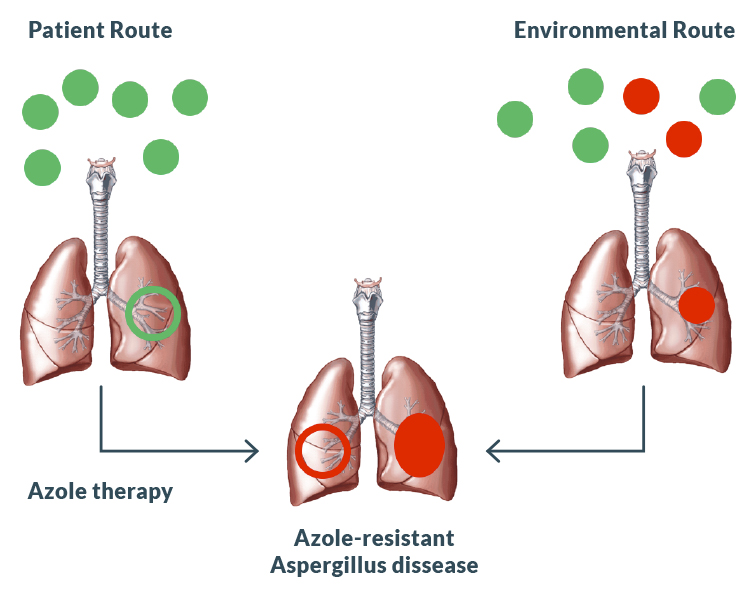Aspergillus fumigatus causes a range of diseases in humans including allergic syndromes but also acute invasive aspergillosis in immunocompromised patients. For the management of diseases we rely on azole drugs, including itraconazole, voriconazole and posaconazole. These agents are effective if the isolate is susceptible to the azole class of drugs.
It is important to detect resistance as early as possible because studies have shown
that patients who are infected by an azole-resistant Aspergillus fumigatus have a high
probability to fail to therapy. In the last decade azole resistance has increasingly been reported in the human fungal pathogen fumigatus. Azoles comprise the main class of antifungal agents used to treat diseases, and loss of this class has major consequences for patiënt management. There are two routes of resistance development: through azole treatment of patients and through the use of azole compounds in the environment.

Longterm azole therapy of patients with chronic pulmonary aspergillosis might result in the development of azole resistance, especially if patients have a cavity or a aspergilloma. We think that Aspergillus fumigatus can reproduce through sporulation (asexual reproduction) and that this facilitates the development of resistance. When Aspergillus fumigatus is cultured from these patients, individual colonies might harbor different azole-susceptiblity. Therefore multiple colonies need to be investigated for resistance.
Azole resistance selection is also thought to occur through the use of azole compounds in the environment. Azoles are widely used for crop protection (from fungal diseases) and preservation of materials. Although Aspergillus fumigatus is not a plant pathogen, it is believed that the fungus is exposed to azole compounds and develops azole resistance mechanisms. Because the azole fungicides have a similar molecule structure to the medical triazoles, the latter show limited or no activity against resistant isolates. As patients are exposed to azole-resistant Aspergillus fumigatus spores in the environment, any patient can develop azole-resistant aspergillosis if he/she lives in an environment where azole-resistance has been found. Azole-resistant Aspergillus fumigatus is widely found in the environment, including in Europe, the Middle East, Asia, Africa and Australia. The prevalence of azole resistance will vary between countries and institutes.